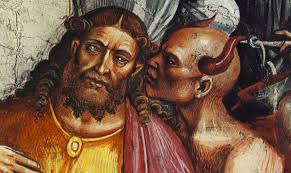The Burden of the LORD
23: 33-40
The burden of the LORD DIG: What catchphrases did the “religious people” use in Jeremiah’s day? Why were the people of Judah forbidden to use it? What would be a modern equivalent of this phrase, often heard in shul or church today? What would become of those who insisted on claiming to speak the LORD’s Word even after they were warned of His judgment on their lies (23:37-40)? Who has become a burden to YHVH? What does this reveal to us about the emotions of God? Why is He weary of all this? What will God do to unburden His people (20:11)?
REFLECT: What is involved, where, when, with whom? For what do you have a burden today? Do you have a message to give? An action to take? A situation to remedy? In what way is that burdensome?
597 BC during the eleven-year reign of Zedekiah
This section of Scripture is built around the word massa’ and can mean two things. First, it can mean a heavy burden, a heavy message or something heavy; or, secondly, it can mean a prophecy (oracle). In general, the main thrust here is that the prophetic office is to be undertaken with great seriousness. Only those to whom ADONAI entrusts His word are entitled to proclaim it. Imposters would incur divine judgment.
Prophets usually began their message with the phrase: The burden (massa’) of the LORD concerning . . . this or that. God spoke of burdens indeed, the burdens of guilt piled up by the people and the burdens of penalties to follow in the wake of this massive guilt. So YHVH tells Jeremiah: When [someone from] this people, a prophet or a cohen (a priest) sneeringly asks you, “What is the burden (massa’) of the LORD today? Have you thought up a new burden for us? Have you heard Jeremiah’s latest burden? Jeremiah was to answer them with a pun, saying to them, “Burden (massa’)! What burden (massa’)?” You are the burden (massa’). ADONAI says He will abandon you (23:33 CJB).
The judgment will come upon all classes of people. YHVH will punish anyone, supposed prophet, priest, or anyone else who claims to have the burden (massa’) of the LORD. If a prophet or a cohen or anyone else speaks about “The burden (massa’) of ADONAI.” I will punish them and their household. So, when you speak with your friends or other Israelites, ask, “What answer has ADONAI given?” or “What has ADONAI said?” They should not be flippant with that expression any more. God now forbids the use of that expression because of its misuse. Don’t use the expression, “burden (massa’) of the LORD” any more. If anyone does use it (note the pun here) for every person’s own word will be their burden (massa’) because they had perverted, or twisted the true words of the living God, the LORD of heaven’s angelic armies, our God (23:34-36 CJB). The massa’ of the LORD was that the people were a massa’ to Him.

There will be a special judgment upon the false prophets. In the near historical future there will be some embarrassing questions to be asked of the false prophets. When all their prophecies fall flat and are unfulfilled, in fact when things come to pass in direct opposition to what they had prophesied, the question will be asked: What answer has ADONAI given you? They will have nothing to say. Or, What did ADONAI say? Once again, nothing but silence. And they better say nothing, they had better admit that they received no revelation from God. But if the false prophets continue to talk about “the burden (massa’) of ADONAI,” after God had already sent them the order not to use that phrase, showing them to be defiant, God would lift that false prophet up, burden (massa’) that he was, abandon him (judge him), throwing him away from ADONAI’s presence – both him and the City ADONAI gave to him and his ancestors. Then YHVH will subject that false prophet to everlasting disgrace – eternal, unforgettable shame (23:37-40 CJB).



Leave A Comment